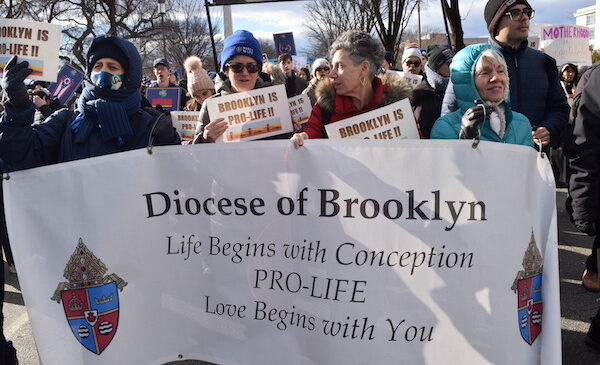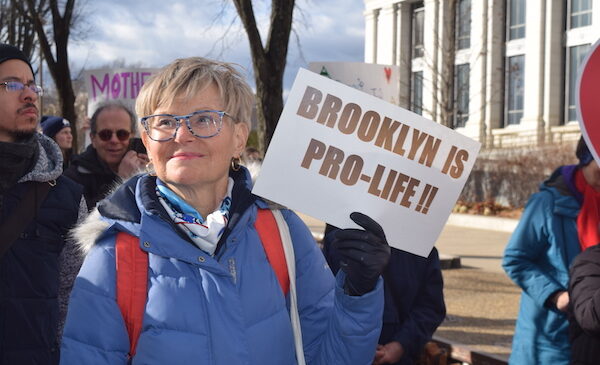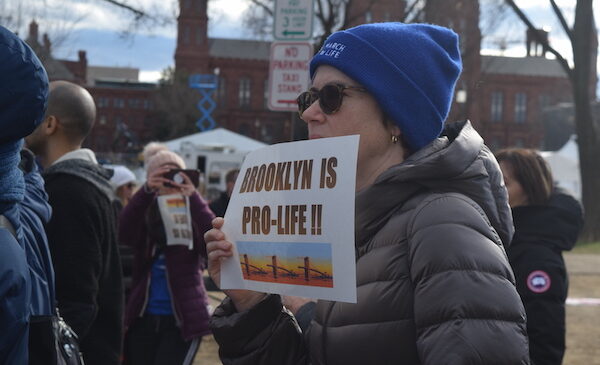Bishop Brennan: ‘New York is very far from that culture of life’
WASHINGTON — Deacon John Cantirino and Denise Collins both remember the decades before the Supreme Court overturned Roe v. Wade on June 24, 2022, when it seemed like the landmark 1973 decision was here to stay.
“I was trapped in this mindset that because of Roe v. Wade, nothing would ever change,” said Collins, a parishioner from Immaculate Heart of Mary Church in Windsor Terrace.
Deacon John, also from Immaculate Heart of Mary Church, added that many believed Roe was “the law of the land.”
Collins and Deacon John traveled to the 2023 March for Life on one of five buses, carrying around 250 people from Brooklyn and Queens, according to the diocese.
Given their mindset and the nearly 50 years of advocacy that preceded the Supreme Court’s decision, there was optimism and celebration from the pro-life movement once it came down, understandably so. Seven months later, however, the challenges associated with a post-Roe U.S. — where the state legislatures control abortion law — have been realized nationwide.
Instead of the fetal viability standard set by Roe — the point that a baby can survive outside of the womb approximately 24 weeks into a pregnancy — abortion law from state to state now ranges from all-out bans on the procedure to allowance of the procedure throughout a pregnancy.
“I think advocacy now is actually a bit more challenging because we have to make people think about something no one was really thinking about,” Collins said. “It was kind of out of peoples’ hands.”
There are few places where pro-life advocacy is more difficult than New York, where the state and lawmakers are overwhelmingly pro-abortion. That reality is part of why Diocese of Brooklyn Catholics found it important to participate in the first post-Roe March for Life. They wanted to stand in solidarity with the national pro-life movement but also send a message back home.
“There’s a mentality in New York that everybody has to be pro-abortion, and if you’re not, somehow you’re almost a second-class citizen,” Deacon John said. “But I think there’s a lot of people who are pro-life, but they’re afraid to speak out because there’s tremendous social and political pressure to keep quiet.”
Bishop Robert Brennan, who was present at the march and the National Prayer Vigil for Life at the Basilica of the National Shrine of the Immaculate Conception the night before, acknowledged that while it’s a good thing that the Supreme Court shifted the abortion conversation to the states, “we also know that the reality in New York is very far from that culture of life.”
Abortion in New York is legal through 24 weeks of pregnancy and after 24 weeks if the patient’s “health or pregnancy is at risk.” However, pro-life advocates, including the state’s Catholic bishops, have argued that there really aren’t any restrictions on late-term abortions because of its broad language.
Under Governor Kathy Hochul, New York has also become an “abortion sanctuary” for people from outside the state. The restrictions on who can provide an abortion in the state are also looser than in others, and the procedure is available via both medication and in-clinic.
New York City, in particular, became the first city in the country this week to offer abortion pills free of charge at a city health clinic — the first step of a $1.2 million package to expand reproductive care in the Big Apple. The clinic is located in the Bronx and is the first of four that will offer the pills before the end of the year. The other three clinics will be in Queens, Manhattan, and Brooklyn.
Before the move, abortion pills were already available in the city’s 11 Health+Hospital locations.
“The system needs to change. We must do better, and we will do better,” Mayor Eric Adams said at a news conference announcing the plan. “For New York City to truly lead the nation, we must go further.”
Collins said she has called state legislators to remind them that they represent all of the people of the state, “not just the progressives and the abortion supporters.”
“I think it will be difficult to break through,” she said.
Bishop Brennan recognizes the challenges that lie ahead in New York, as well. He said the key to creating change in the state is not just through changing laws but through changing hearts.
“Changing the law only does so much, but really what’s needed is a change of heart and conversion of heart, and that’s going to be a long slog,” he said. “But we have to be patient and walk with people and really try to show why that conversion is needed.”



